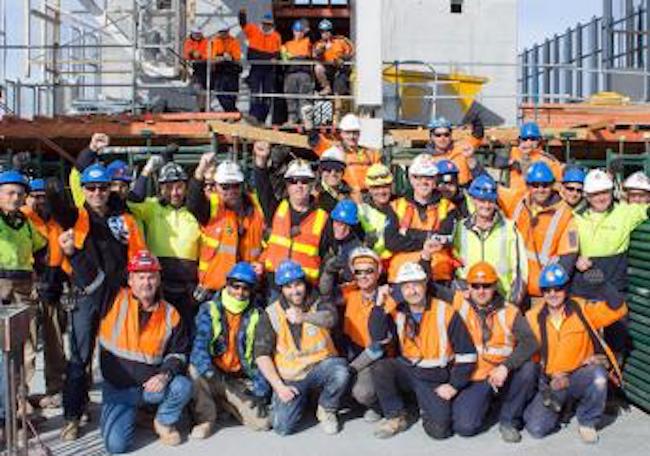SEOUL, South Korea — Keeping diplomatic developments coming at a head-snapping pace, the South Korean government said on Sunday that North Korea’s leader, Kim Jong-un, had told President Moon Jae-in that he would abandon his nuclear weapons if the United States agreed to formally end the Korean War and promise not to invade his country.
In a confidence-building gesture ahead of a proposed summit meeting with President Trump, a suddenly loquacious and conciliatory Mr. Kim also said he would invite experts and journalists from South Korea and the United States to watch the shutdown next month of his country’s only known underground nuclear test site.
In Washington, Trump officials spoke cautiously about the chances of reaching a deal and laid out a plan for the dismantling of the North’s nuclear program, perhaps over a two-year period.
That would be accompanied by a “full, complete, total disclosure of everything related to their nuclear program with a full international verification,” said John R. Bolton, Mr. Trump’s new national security adviser.
The apparent concessions from the youthful leader were widely welcomed as promising signs of ending the standoff on the Korean Peninsula, frozen in place since fighting in the Korean War ended 65 years ago.
But skeptics warned that North Korea previously made similar pledges of denuclearization on numerous occasions, with little or no intention of abiding by them. Mr. Kim’s friendly gestures, they said, could turn out to be nothing more than empty promises aimed at lifting sanctions on his isolated country.
A South Korean government spokesman, Yoon Young-chan, provided remarkable details of a summit meeting the two Korean heads of state held on Friday, when Mr. Kim made history by becoming the first North Korean leader to set foot in the South.
“I know the Americans are inherently disposed against us, but when they talk with us, they will see that I am not the kind of person who would shoot nuclear weapons to the south, over the Pacific or at the United States,” Mr. Kim told Mr. Moon, according to Mr. Yoon’s account.
It was another in a series of startling statements by Mr. Kim, whose country threatened to do exactly those things during the height of nuclear tensions last year.
Mr. Kim’s apparent willingness to negotiate away his nuclear arsenal was revealed just as Secretary of State Mike Pompeo spoke for the first time about a “good conversation” he had with Mr. Kim during his secret visit to Pyongyang, the North Korean capital, over Easter weekend.
Mr. Pompeo told ABC News in a broadcast on Sunday that the Trump administration’s objective was “complete, verifiable, irreversible denuclearization” with North Korea, and that Mr. Kim was prepared to “lay out a map that would help us achieve” denuclearization.
“We had an extensive conversation on the hardest issues that face our two countries,” Mr. Pompeo said. “I had a clear mission statement from President Trump. When I left, Kim Jong-un understood the mission exactly as I described it today.”
In a confidence-building gesture ahead of a proposed summit meeting with President Trump, a suddenly loquacious and conciliatory Mr. Kim also said he would invite experts and journalists from South Korea and the United States to watch the shutdown next month of his country’s only known underground nuclear test site.
In Washington, Trump officials spoke cautiously about the chances of reaching a deal and laid out a plan for the dismantling of the North’s nuclear program, perhaps over a two-year period.
That would be accompanied by a “full, complete, total disclosure of everything related to their nuclear program with a full international verification,” said John R. Bolton, Mr. Trump’s new national security adviser.
The apparent concessions from the youthful leader were widely welcomed as promising signs of ending the standoff on the Korean Peninsula, frozen in place since fighting in the Korean War ended 65 years ago.
But skeptics warned that North Korea previously made similar pledges of denuclearization on numerous occasions, with little or no intention of abiding by them. Mr. Kim’s friendly gestures, they said, could turn out to be nothing more than empty promises aimed at lifting sanctions on his isolated country.
A South Korean government spokesman, Yoon Young-chan, provided remarkable details of a summit meeting the two Korean heads of state held on Friday, when Mr. Kim made history by becoming the first North Korean leader to set foot in the South.
“I know the Americans are inherently disposed against us, but when they talk with us, they will see that I am not the kind of person who would shoot nuclear weapons to the south, over the Pacific or at the United States,” Mr. Kim told Mr. Moon, according to Mr. Yoon’s account.
It was another in a series of startling statements by Mr. Kim, whose country threatened to do exactly those things during the height of nuclear tensions last year.
Mr. Kim’s apparent willingness to negotiate away his nuclear arsenal was revealed just as Secretary of State Mike Pompeo spoke for the first time about a “good conversation” he had with Mr. Kim during his secret visit to Pyongyang, the North Korean capital, over Easter weekend.
Mr. Pompeo told ABC News in a broadcast on Sunday that the Trump administration’s objective was “complete, verifiable, irreversible denuclearization” with North Korea, and that Mr. Kim was prepared to “lay out a map that would help us achieve” denuclearization.
“We had an extensive conversation on the hardest issues that face our two countries,” Mr. Pompeo said. “I had a clear mission statement from President Trump. When I left, Kim Jong-un understood the mission exactly as I described it today.”
















 sign up for
sign up for 